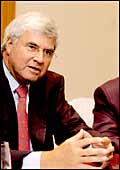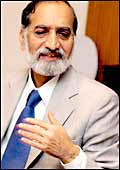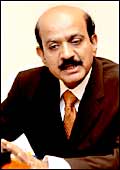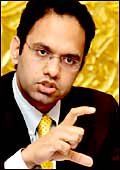 |
| Engineering the future: B.V.R.
Mohan Reddy, Chairman and Managing Director, Infotech Enterprises;
Kevin Dehoff, Vice-President, Bram Bluestein (centre), Senior
Vice President, Vikas Sehgal, Executive Director (India Business),
Booz Allen Hamilton; and Kiran Karnik, President, Nasscom |
ESO.
engineering services Outsourcing. Everyone would do well to remember
the term. After it services, it enabled services, and new new
thing it infrastructure management (fine, remote it infrastructure
management), this, ESO, is the new, new new thing. So says a report
that has been put out by Nasscom in association with consulting
firm Booz Allen Hamilton. How attractive is the opportunity? $40
billion by 2020. A few hours before the report was to be released
Business Today got the authors of the report, Bram Bluestein,
Senior Vice President, Kevin Dehoff, Vice President, and Vikas
Sehgal, Executive Director (India Business), Booz Allen Hamilton,
B.V.R. Mohan Reddy, Chairman and Managing Director, Infotech Enterprises,
one of India's pioneering ESO companies, and Kiran Karnik, President,
Nasscom, to sit down and discuss the key findings. The discussion
was moderated by Business Today's
Managing Editor R. Sukumar. Excerpts:
R. Sukumar: The first issue I'd like
to discuss is people. I don't know if you have seen the paper
put out by Vivek Wadhwa, an entrepreneur who now teaches at Duke.
He says India doesn't produce as many engineers as everyone thinks
it does. At one level, without going into the nuances of either
the quality of engineers or the report itself, I thought that
would be something that would have a bearing at ESO.
Vikas Sehgal: Wadhwa says China's
numbers are very high because the big part of it is the diploma,
the two-year school they have, which skew the number in a very
dramatic manner. In fact, you look at the numbers he has upfront,
they say, India plus the us, is less than China. Keep in the mind
that in China this was driven by socialist policies initially
which focussed on getting (people) to work in the plants. You
need more than that to play an engineering off-shoring game. We
guess these numbers are true but for the business we are talking
about, of engineering off-shoring, they will have to be modified
heavily. When you look at that number, the US has the maximum
production of engineers, next is India and China is pretty far
behind.
 |
"The Indian manufacturing
industry and the ESO industry will go hand in hand as we go
forward."
Bram Bluestein
Senior Vice President, Booz Allen Hamilton |
RS: Another layer to this thing about
engineers is that all through the 1990s, when the first wave of
it services was on, anyone who went to engineering college would
have this desire, irrespective of their stream, whether it was
mechanical or chemical or electronics, to acquire skills in software
and go to work for the software industry. This trend continues
even today. Whereas, if you look at the skills required for ESO,
which you have spoken of in the report, it is largely core engineering
skills in addition to some it skills.
BVR Mohan Reddy: If you look at the
curriculum in Indian colleges, there is not so much dilution that
has happened in the areas like mechanical engineering, chemical
engineering or civil engineering. There is some amount of work
that they do in it, but the core competence in mechanical engineering
or chemical engineering or civil engineering has not changed.
Some students who get into mechanical engineering
do so, not because they cannot get into software engineering but
because they want mechanical. But they migrate to it because the
job opportunities are more in it. Today with engineering services
becoming fairly dominant, people will do what they like to do.
They want to design aircraft engines. They want to design cars.
They want to get into styling. That is their ambition; not writing
code. In the past, this opportunity wasn't there; now it is.
 |
"The concern I have is the desperate
need for radical education reform encompassing quality & quantity
issues."
Kiran Karnik
President, Nasscom |
Kevin Dehoff: Even in traditional mechanically
focussed products, more of the functionality is actually coming
from the software and the systems integration aspect. In aerospace,
traditional hardware is becoming something like 20-30 per cent
of the value of the product, whereas the systems integration and
embedded software has become, like, 70 per cent. That is also
happening in the automotive industry.
RS: How important is it, from the point
of succeeding in ESO, to have a vibrant industry in that particular
discipline, catering either to the domestic market, or as is the
case with automobile ancillaries, an export market?
Reddy: It is important to have a vibrant
domestic sector; that's where you will see more domain knowledge
being created, a critical factor. We already have a strong manufacturing
industry although it doesn't reflect in our GDP; it was 22 per
cent of GDP last year.
Bram Bluestein: I think the best example
is your automotive industry. By 2020, India would be one of the,
if not the, largest auto market(s) in the world. The two (a local
manufacturing industry and the ESO industry) will grow hand in
hand as we go forward.
 |
"In India, the enormous domain
knowledge is there. But I am concerned at the volume of people
required."
B.V.R. Mohan Reddy
Chairman and Managing Director, Infotech Enterprises |
Reddy: Don't just look at the manufacturing
space; look at the research and development base that is there
in India. The number of public sector research labs and institutions....
That base is available for exploitation today.
RS: If you look at the barriers to
ESO, are they going to be very similar to the barriers to BPO?
Will there be any other significant barriers?
Karnik: There will be one very important
difference. In the IT and it enabled services space, although
there is enough research to show there is no correlation and people
have gone back and forth, there is some amount of perception that
moving work equals moving jobs. In this area it is vastly different.
You are very often doing things which are not being done or cannot
be done. You are not moving existing work.
Bluestein: In the short term, the incentive
for doing this is the economic benefit. But growing global capabilities
is the real opportunity. This is not about substitution (moving
work from one location to another).
RS: Quite a few transnational companies
already have R&D or innovation centres here. Going forward,
do you think that is going to be the preferred model? A captive
one as opposed to a third-party one?
 |
"The key thing is the O part
of the ESO and India is the only country to have perfected
offshoring."
Vikas Sehgal
Executive Director (India), Booz Allen Hamilton |
Reddy: We have some very successful
independent vendors in it and it enabled services (think Infosys,
TCS, Wipro, Genpact, WNS) and the Indian entrepreneur brings a
certain amount of value.
RS: Well, in it and BPO, the trend
is definitely in favour of third-party outsourcing.
Bluestein: There are really two costs
in outsourcing. One is transition cost, and the other is operating
cost. In setting a captive you minimise your transition cost,
particularly when there isn't a strong vendor community. Over
time, the value is in talent and the vendor community should win
because it is going to be more innovative and capable; you have
to remember how hard it is to maintain the competitiveness of
a captive when you are not based in that country. But they are
all going to survive.
Sehgal: $1 billion to $40 billion.
There's so much to do; we need them both.
 |
"The ESO opportunity is not
lost on other parts of the world. We expect to see many entrants
coming into the market."
Kevin Dehoff
Vice President, Booz Allen Hamilton |
Dehoff: I actually think it is good
that there are multiple models. We are getting to the core of
the core here (with ESO), the essence of a company. And there
will be issues related to competitive advantage and intellectual
property.
RS: Finally, what do you think the
one thing working in India's favour in the whole ESO thing, and
the one thing working against?
Sehgal: The key thing is the o part
of the ESO and India is the only country in the world to have
perfected offshoring. What can prevent India? India can prevent
India and it has shown itself capable of doing so in the past.
Bluestein: India's fundamentals are
really compelling: the foundation in it and it enabled services,
the talent, and the global competitiveness. The one concern is
that India may underestimate the opportunity.
Dehoff: It is a natural evolution from
it and it enabled services to ESO. However, this opportunity isn't
not lost on other parts of the world. We expect to see a lot of
entrants coming into the market.
Reddy: Talent is the key driver for
this industry and that is one thing going for India, the enormous
domain knowledge already there. But I am concerned at the volume
of people required. A $40 billion opportunity would mean a requirement
of a million people.
Karnik: The thing going for us is
the technological foundation that has been put down in India starting
the 1950s. The concern I have is the desperate need for radical
education reform that encompasses issues related to quality and
quantity. I don't see that happening in a business-as-usual model.
|










